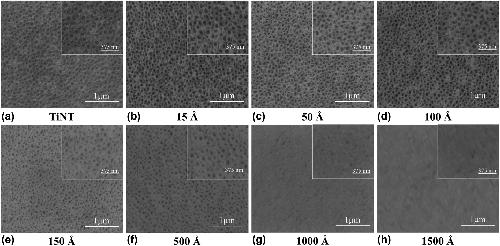Journal of Materials Research ( IF 2.7 ) Pub Date : 2020-05-26 , DOI: 10.1557/jmr.2020.107 Murali Krishna Duvvuru , Lupeng Wu , Nicole S. Lin , Tao Xu , Sahar Vahabzadeh

|
Surface modification of titanium and titanium alloys is a common method to improve anchoring of bone tissue and implants in hard tissue engineering applications. In the current work, a combination of chemical and physical methods (anodization and physical vapor deposition) was used to roughen the titanium surface and deposit iron (Fe) on the surface of titanium at different thicknesses. The optimized thickness of 100 Å was selected for mechanical and biological characterization. We found that anodization increases the surface roughness of Ti from 21 ± 0 to 229 ± 9 nm, whereas Fe deposition does not change it significantly. Our results also showed that surface modification of Ti by anodization increases the proliferation of osteosarcoma cells at both time points, whereas Fe-deposited samples showed the lowest cellular activity. These results suggest that Fe-deposited Ti implants may be suitable candidates for patients with osteosarcoma, as the proliferation of malignant cells decreases in the presence of Fe.
中文翻译:

阳极氧化和铁沉积对钛进行的表面处理:机械和生物学性能
钛和钛合金的表面改性是在硬组织工程应用中改善骨组织和植入物锚固的常用方法。在当前的工作中,化学和物理方法(阳极氧化和物理气相沉积)的结合被用来使钛表面变粗糙,并以不同的厚度在钛表面沉积铁(Fe)。选择了100Å的最佳厚度进行机械和生物学表征。我们发现,阳极氧化可将Ti的表面粗糙度从21±0增加到229±9 nm,而Fe沉积不会明显改变它。我们的结果还表明,通过阳极氧化处理对Ti进行表面修饰可在两个时间点均增加骨肉瘤细胞的增殖,而铁沉积的样品显示出最低的细胞活性。



























 京公网安备 11010802027423号
京公网安备 11010802027423号